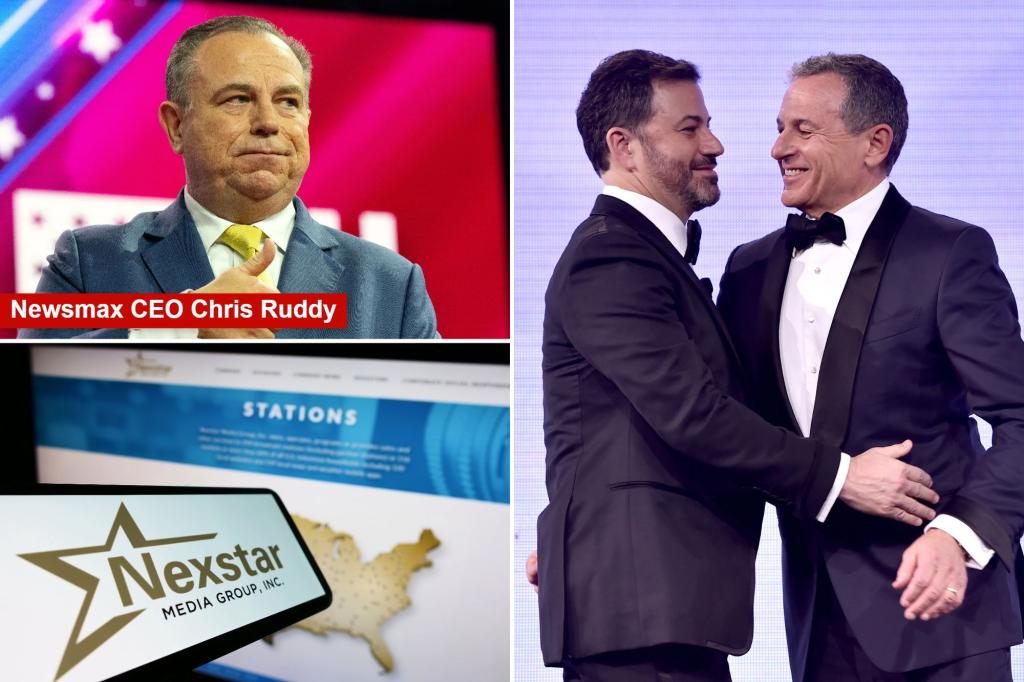Nexstar Media’s throttling of Jimmy Kimmel’s late-night show is a massive headache for Disney CEO Bob Iger – but it won’t necessarily be enough to convince regulators to greenlight the local TV giant’s controversial, megabuck merger, On The Money has learned.
The Irving, Texas-based broadcaster – which said Wednesday it will continue to suspend broadcasts of “Jimmy Kimmel Live!” following the comedian’s return late Tuesday to ABC – faces major hurdles in getting White House approval for its $6.2 billion deal to buy Tegna, a rival broadcaster, sources close to the deal say.
Those include significant opposition from Republicans on Capitol Hill and two right-leaning news networks, One America News Network and more importantly Newsmax. The latter is of particular concern as Newsmax’s CEO, Chris Ruddy, has close ties to top GOP lawmakers, the Trump White House and President Trump himself, according to insiders.
The argument is that Nexstar’s continued suspension of Kimmel – who failed to apologize on Tuesday for his false claims about Charlie Kirk’s alleged assassin – is nothing more than a ruse to convince the White House its programming is watchful of left-wing bias as it seeks approval for the Tegna deal, and Nexstar will control far too much of the local broadcast market if the deal proceeds.
Sources close to the matter say these criticisms are starting to carry added weight inside the White House and with its regulators at the Federal Communications Commission.
“I don’t think Trump’s regulators will approve this no matter how long Nexstar suspends Kimmel,” said one media insider who is close to the White House.
Nexstar, even without the purchase of Tegna, is a huge player in the local TV market. It owns around three dozen so-called ABC affiliates that are licensed to run the network’s content including sports, entertainment, news, and Kimmel’s late-night show, “Jimmy Kimmel Live.”
On Wednesday, the company said in a statement that it “is continuing to evaluate the status of ‘Jimmy Kimmel Live!’ on our ABC-affiliated local television stations, and the show will be preempted while we do so.”
Nexstar added that its bosses “are engaged in productive discussions with executives at The Walt Disney Company, with a focus on ensuring the program reflects and respects the diverse interests of the communities we serve.”
A spokesman, Gary Weitman, didn’t return a call for comment.
ABC and its parent Disney reinstated Kimmel after a five-day suspension following a monologue last week in which he inaccurately stated that the “MAGA gang” was looking to capitalize on Kirk’s assassination by making the killer out to be “anything other than one of them.”
Amid the uproar, both Nexstar and Sinclair – a rival local TV giant whose politics lean to the right – suspended Kimmel indefinitely. Both broadcasters have or will need Trump’s regulatory approval for licenses and mergers.
FCC Chairman Brendan Carr has made no secret that he wants national and local broadcasters who air programming over public airwaves (as opposed to cable) to abide by the FCC “public interest” rule, which he believes means broadcasters just can’t air a steady stream of purely left-wing programming.
He has threatened to withhold his approval of local broadcast licenses – and throttle M&A – if the networks don’t provide more balance.
Nexstar is hoping that its suspension of Kimmel provides the balance that the Trump FCC wants, people with knowledge of the matter say. Publicly, the big broadcaster says the suspension is unrelated to the Tegna approval, but most media insiders are skeptical.
Ruddy, meanwhile, has been making the case that Nexstar deserves no credit for its criticism and then suspension of Kimmel, and he has found some common ground in Congress and with Trump regulators in recent days, sources say.
Nexstar, Ruddy is arguing, has been allowing Kimmel to pile onto Trump for years. The broadcaster also owns the cable network NewsNation, whose lineup includes ex-CNN anchor Chris Cuomo.
On top of it all, Ruddy is pointing out that the newly merged company would reach nearly 80% of all US households, well above the current 39% cap that the government has been raising to spur consolidation of local TV amid cost pressures.
It would have a near monopoly on local broadcastings.
Carr didn’t return a call for comment; Ruddy had no comment.
Read the full article here

